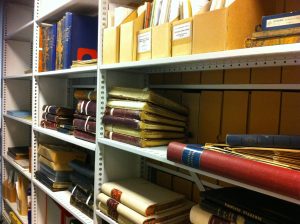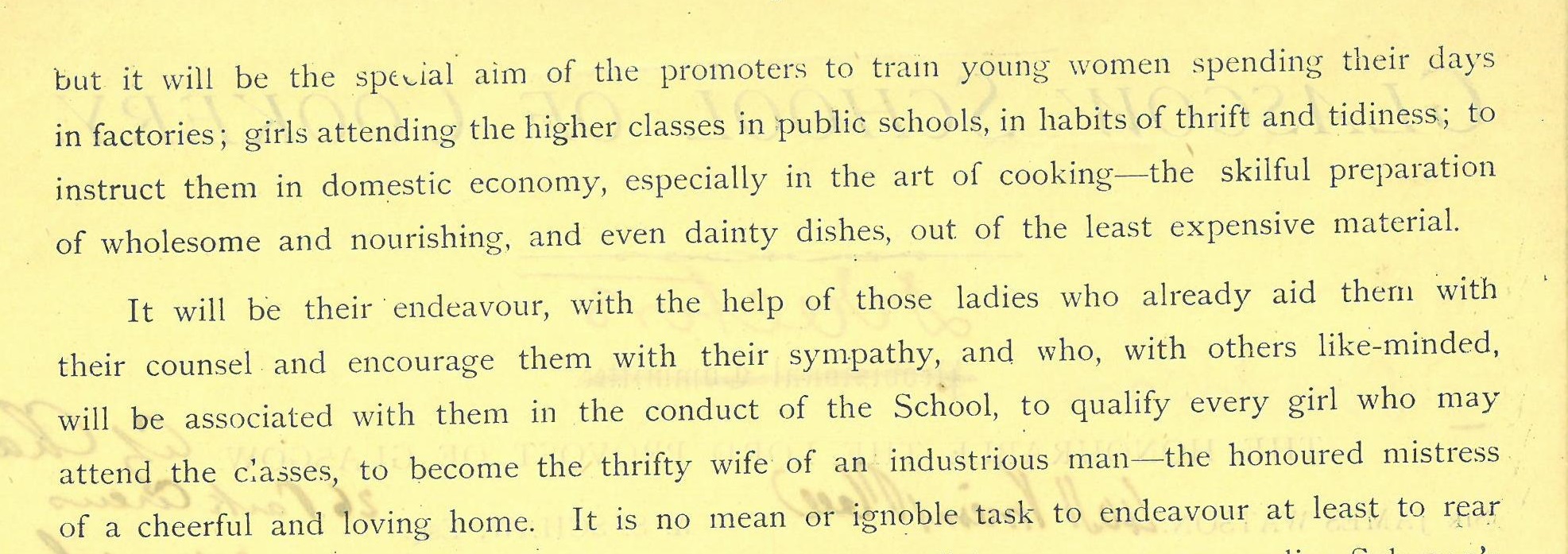A Wellcome Trust Research Resources Project
 On first walking into the archive store and seeing the rows of shelves lined with fascinating objects, books, folders and boxes of different shapes and sizes, it is hard not to compare them with larder shelves, especially knowing that the archive collections are from cookery schools and a college of domestic science. Each shelf holds an assortment of coloured packages which when opened reveal the ingredients that provide the different flavours of life that went on within those institutions. These are the archives of three of Glasgow Caledonian University’s predecessor institutions and The Wellcome Trust has funded a 12 month project, “Poverty, Health, Diet and Education in Glasgow: from Domestic Science to the Allied Health Professions, 1875-1993”, to sort, catalogue, preserve and share the collections.
On first walking into the archive store and seeing the rows of shelves lined with fascinating objects, books, folders and boxes of different shapes and sizes, it is hard not to compare them with larder shelves, especially knowing that the archive collections are from cookery schools and a college of domestic science. Each shelf holds an assortment of coloured packages which when opened reveal the ingredients that provide the different flavours of life that went on within those institutions. These are the archives of three of Glasgow Caledonian University’s predecessor institutions and The Wellcome Trust has funded a 12 month project, “Poverty, Health, Diet and Education in Glasgow: from Domestic Science to the Allied Health Professions, 1875-1993”, to sort, catalogue, preserve and share the collections.
On the menu we have two starters, the Glasgow School of Cookery (1875) and the West End School of Cookery (1878), rival cookery schools who merged in 1908, to become our main course, the Glasgow and West of Scotland College of Domestic Science, later named the Queen’s College, Glasgow. Affectionately known as the ‘Dough School’, the Queen’s College eventually merged with Glasgow Polytechnic in 1993 to become Glasgow Caledonian University.
The success of any recipe is to get the basic ingredients right and so it is not surprising that GCU, as the University for the Common Good, has the same philanthropic ethos at its roots. In the 1870s, when the two cookery schools were established, Glasgow was one of the major cities of the British Empire, with flourishing heavy industries and shipbuilding and a leading centre in intellectual thought and research. But despite growing economic wealth there was widespread poverty and deprivation amongst the working classes. The rapidly expanding population resulted in overcrowding in homes with poor sanitation, and low wages for unskilled labourers meant less food on their tables leading to serious health problems in those communities.

From a fundraising leaflet detailing the Committee’s aims in setting up the Glasgow School of Cookery, 1875
The Glasgow School of Cookery was set up to teach cookery, nutrition and hygiene with the aim of tackling public health problems through the education of working class women, teaching them
…the skillful preparation of wholesome and nourishing, and even dainty dishes, out of the least expensive material.
Daytime classes for more affluent women helped to subsidise evening classes for working women and gradually classes were offered out of the confines of the Glasgow School and taught in Board Schools around Glasgow and local towns and villages. It soon became apparent that the way to raise public culinary and hygiene standards was to teach it to girls in elementary schools and so teacher training was added to the syllabus. The West End School of Cookery was set up on similar principals and when the two schools amalgamated the same recipe was followed, and enriched over the years adding new ingredients to suit changing tastes. It provided crucial nutrition advice and education to help the armed services and civilians through two World Wars of shortages and rationing, it introduced innovative research pushing the boundaries of domestic science and food and nutrition education. In the changing face of industry the menu of courses also changed with domestic science taking on a business flavour by adding catering and institution management to the syllabus. As new social issues emerged in the 1970s social work courses were added to the menu, and by the 1980s the College was tackling health issues through the provision of training for the allied health professions such as physiotherapy, orthoptics, and radiography.
Over the next few months the items on the shelves will be unpacked and their contents revealed. The bundles of committee papers, student records, letters, photographs, ledgers, newscuttings, reports and other ingredients will be arranged, catalogued and shared through social media, an online exhibition and at the Archive Centre. They are sure to cook up a number of interesting dishes satisfying a range of palettes including:
- history of the Queen’s College, Glasgow (formerly the Glasgow and West of Scotland College of Domestic Science), governors, staff, students, buildings and far reaching activities
- impact of war on the lives of civilians and education institutions
- evolution of domestic science education
- development of research in nutrition and health
- changes in the Scottish curriculum to meet the needs of society
This blog will provide a taster menu of the records, with monthly posts showcasing different aspects of the collection. To keep your taste buds tingling follow #GCUHistPublicHealthEd on Twitter to see some of the delights from the collections.
Kirsty Menzies
Wellcome Trust funded Project Archivist



This is really exciting! I’m doing a PhD on health, dirt and vegetable growing 1930-1970. I look at domesticity and gender in relation to house and garden, including how this was shaped by domestic science lessons, so if you find any juicy evidence, particularly about dealing with fresh vegetables, or encouraging women to use processed vegetables as they were cleaner and more convenient, I’d be really interested!
The blog’s great, really well written. Thank you!
Hi Sophie
Thanks very much for your comment, I’m glad you liked my blog. Although the collection isn’t catalogued yet and I’m still learning about it, I can think of a few areas that may be of interest to you e.g. fruit and vegetable preservation, optimum cooking methods retaining nutritional value, students and staff growing vegetables in the playing fields during the war years. Your PhD sounds very interesting and I will email you directly to discuss this in more detail.